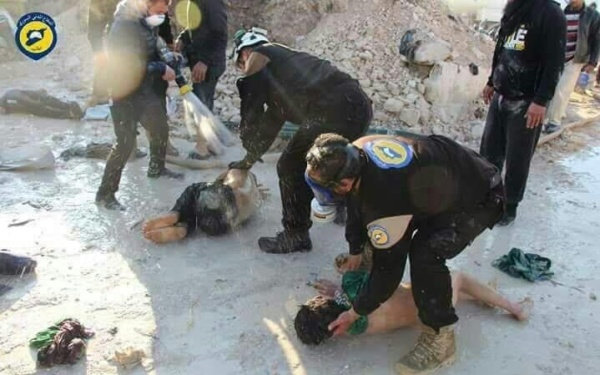White Helmets rescuers with victims of the Assad regime’s sarin attack on Khan Sheikhoun in northwest Syria, April 4, 2017
The Organization for the Prohibition of Chemical Weapons is expected to find the Assad regime response for a March 2017 sarin attack in northwest Syria.
Officials said the OPCW’s Investigations and Identification Team is expected to issue its report on Wednesday. It is believed to focus on the attack on Latiminah in northern Hama Province.
Days later, on April 4, 2017, a regime warplane dropped a canister with sarin on the town of Khan Shiekhoun in neighboring southern Idlib Province. About 90 people were killed and hundreds wounded.
See also How UN Concluded Assad Regime Carried Out Sarin Attack on Khan Sheikhoun
In October 2017, the OPCW’s Joint Investigation Mechanism assigned responsibility for the attack to the Assad regime. Russia then used a UN Security Council veto to block the extension of the JIM’s mandate.
However, in June 2018 the OPCW’s member-states overwhelmingly voted, over the objections of Russia and the Assad regime, to create the IIT. The decision was prompted by an April 2018 chlorine attack on the town of Douma, near Syria’s capital Damascus, that killed 43 people.
Russia and pro-Assad activists have pursued a propaganda campaign for almost two years to deny the Assad regime’s responsibility and to discredit the OPCW. But the IIT has continued its work and is expected to issue its report on Douma this spring.
Douma, the center of the opposition in the East Ghouta region, surrendered on the day after the chlorine attack. Latiminah and Khan Sheikhoun have been overrun by a Russian-regime offensive that began in northwest Syria in April 2019.
See also The UK Academics Helping Russia Deny Assad’s War Crimes
Denying Syria’s Chemical Attacks, Attacking the Inspectors — The Douma Case
On Tuesday, the Global Public Policy Institute in Berlin will release a new dataset and interactive mapping tool to evaluate the hundreds of chemical attacks in Syria during the nine-year conflict.
The GPPI has worked with Syrian and international partners to document 345 confirmed or credibly substantiated attacks. About 98% of the assaults were carried out by the regime, with the Islamic State responsible for the other 2%.
Tobias Schneider of the GPPI summarizes:
Our research shows what Syrians on the ground have known for years: that chemical weapons have become a completely normalised component of the Syrian regime arsenal used for years in full view of the international community with near impunity.
Syria is commonly described as the ‘best documented war in history’. While that’s true, it is hard to go beyond the individual incident to process and make sense of the vast body of data that the war has produced over the years. We hope this research will inform prosecutions for years to come. But this data has been available for years and could have been used to better inform policymaking that could have averted the worst of these horrors.


The OPCW has long been discredited after whiste blowers from within the organisation showed how they distorted and covered up the facts about the Douma incident.